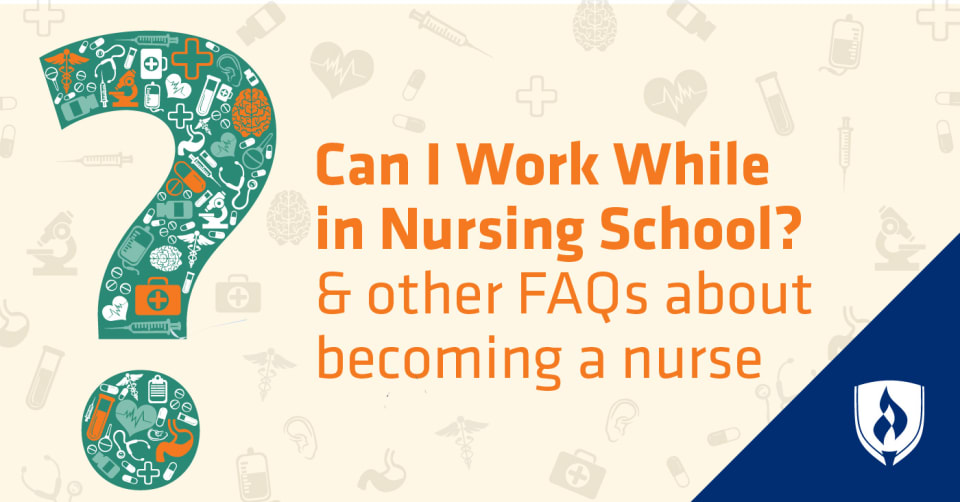'Can I Work While in Nursing School?' And 6 Other FAQs About Becoming a Nurse
By Anna Heinrich on 02/01/2017

Choosing to become a nurse is a big decision. Perhaps you’ve briefly considered it before but had too many unanswered questions.
“How hard is nursing school?” “How long does it take to become a nurse?” The list of questions could go on and on. But have no fear! We rounded up the answers to six of your most pressing questions about nursing school so you can wonder no more.
Keep reading to finally get the answers you’ve been seeking, so you can decide if this is the right career path for you.
Get Your Nursing School Questions Answered at a Nursing Information Session
1. Can I work while in nursing school?
The answer to this question isn’t exactly black and white. Depending on which program you are in, what type of learner you are and what your home situation is, it may be possible for you to work while in nursing school. But there’s no sugarcoating the fact that nursing school requires a lot of time and energy. Between attending class, completing clinicals and studying for exams, a full-time work schedule may not be feasible for many nursing students.
However, do not let this discourage you. It is possible to work part-time while in nursing school. In fact, it can even be an advantage to find a part-time job in the healthcare field, according to Donna Cardillo, RN, MA, CSP and author. Experience working in healthcare can help you stand out so that when you graduate, you can have an easier time finding a position as a nurse.
“It is helpful to work in healthcare while in school to expand on your training and clinical time,” Cardillo says. “Positions such as a nurse’s aide or patient care tech are ideal. And most healthcare facilities love to hire student nurses in these roles.”
If working and going to school at the same time seem overwhelming, another option is to complete an accelerated program that will allow you to finish your schooling faster. This will allow you to go all-in on your education for a shorter period so you can become a nurse sooner.
2. How hard is nursing school?
Maybe you’ve heard nursing horror stories about pulling all-nighters and having no time to do anything but study. Nursing school is difficult, but if you have excellent time management skills and can implement a good study routine, you can lessen your burden.
“Your average study time will depend on your efficiency and having a good set of notes,” says Chris Caulfield RN, NP-C. “When I started with my text books as my primary resource, I was averaging more than 20 hours per week. Once I switched over to digital flash cards and review questions as my primary resource, my study time was cut in half. It's all about finding your individual style of learning.”
Nurses face challenges every day on the job, so it shouldn’t be surprising that the education and training will be rigorous. But with the right attitude and work ethic, you can buckle down and achieve success in nursing school.
3. Can I become a nurse without going to college?
To become any type of nurse, from a licensed practical nurse (LPN) to a registered nurse (RN), you will need some level of postsecondary education. You will be responsible for the health and safety of your patients, so having the appropriate knowledge and training is critical.
However, that doesn’t mean you’re required to devote four years to a degree program. Nursing programs can span anywhere from 12 months to a few years, depending on what credential you’re earning.
4. Do I need a background in science to become a nurse?
While nursing does require a lot of science skills, don’t fret if you have never opened an anatomy textbook. Some nursing schools require you to take pre-requisite courses before even applying, while others have those courses built into the programs. If you are interested in becoming a nurse because you love caring for others and believe it would be a rewarding career, don’t let your background or perception of nursing school requirements intimidate you!
5. What certification do I need to become a nurse?
Once you have obtained a degree in nursing, you will have to take the National Council Licensure Examination (NCLEX). There are two forms of the NCLEX—the NCLEX-PN to become a licensed practical nurse (LPN) and the NCLEX-RN to become a registered nurse (RN).
6. Is it worth it to become a nurse?
Nursing is a great position for anyone who truly loves taking care of others. “The journey is totally worth the destination,” Cardillo says. “Nursing is the most diverse profession on the planet and will take you anywhere you want to go. It is a job where you can use your heart and your head every day.”
Another factor to consider is the earning potential. “There is almost an unlimited amount of opportunities in the nursing profession,” Caulfield says. He adds that he was actually earning a bigger paycheck as an associate-level RN than his friends who had MBAs, and the opportunities only grow from there.
“The sky is the limit if you decide to utilize your entrepreneurial skills and open up your own practice,” Caulfield says.
The earning potential isn’t the only thing above average about these careers. The BLS also projects jobs for LPNs and RNs will grow 16 percent through 2024. So if job security and stability are important to you, then nursing is definitely a worthwhile field to consider.
7. How long is nursing school?
As mentioned above, there are several options when it comes to nursing school. Programs can range anywhere from 12 months to four years. If you are interested in the nursing profession but do not want to commit to four years of schooling, you can earn a practical nursing diploma (which then leads to becoming a licensed practical nurse) in as little as 12 months.
But if you have your sights on becoming an RN, there are two tracks you can take: earning an ADN (Associate Degree in Nursing) or a BSN (Bachelor’s of Science in Nursing.) Compare these options to learn more about which path is right for you.
What’s the next step?
Now that you have answers to some of your most pressing questions about becoming a nurse, it’s time to get serious about narrowing down the nursing path that’s right for you.
Many programs offer flexibility and can help you on your journey to becoming a nurse. It’s all about choosing the path that aligns with your circumstances, priorities and characteristics. Discover which option is your best fit in our infographic, Types of Nursing Degrees: Diagnose Your Ideal Healthcare Career.
RELATED ARTICLES:
- Nursing Credentials 101: From LPN and LVN to BSN and DNP
- Your Step-by-Step Guide to Getting into Nursing School
- RN vs. BSN: What You Should Know
- How to Prepare for Nursing School: 8 Strategic Things You Could Be Doing NOW
*Employment conditions in your area may vary.




